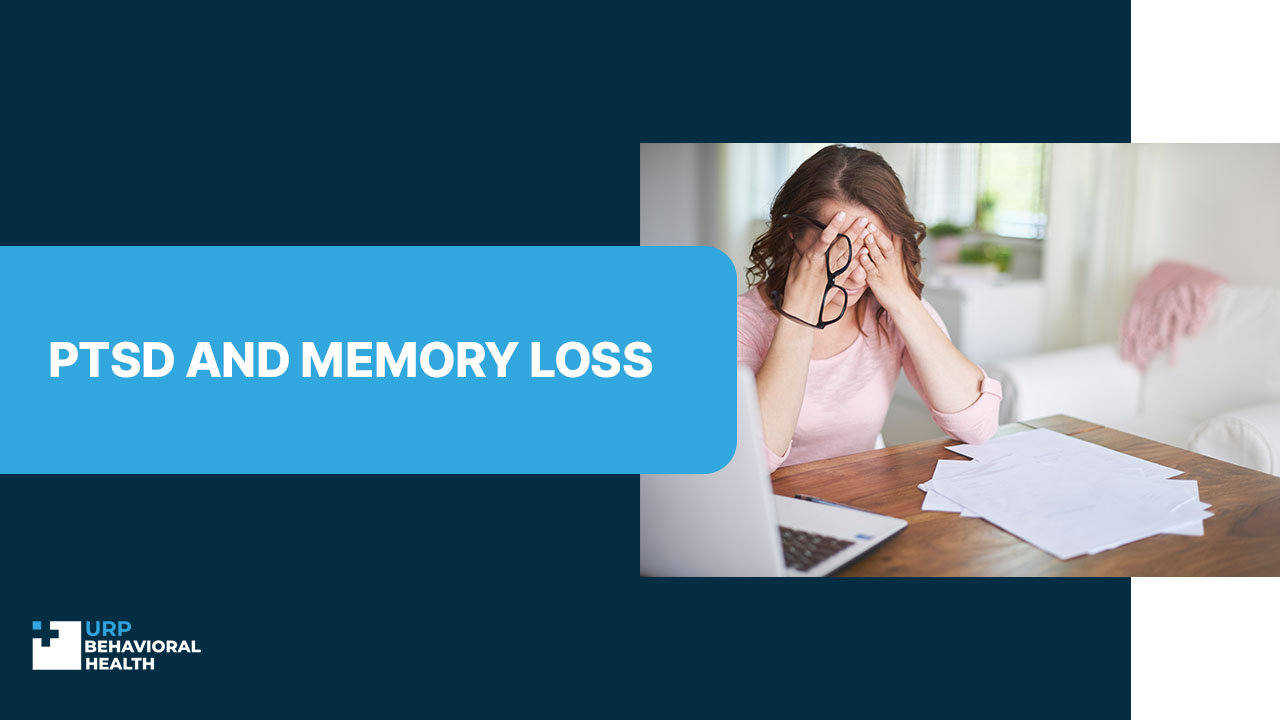
PTSD and Memory Loss: Understanding The Relationship
Post-traumatic stress disorder is a disorder caused by experiencing a strong trauma. There are many сommon symptoms of this illness such as flashbacks, sleep apnea, nightmares, insomnia, anxiety, and depression, but no less important are memory problems, which are also a challenge for those with PTSD.
PTSD causes memory problems which affects not only the health conditions of people but also their functioning on a daily basis. Exploring and understanding the impact of PTSD on people’s memory is crucial for therapists and helps in creating more efficient treatment plans with better outcomes for patients.
Why is memory so important? Memory is an essential cognitive function, the main tasks of which are retaining, retrieving, and using information. Without memory, people wouldn’t be able to resolve simple tasks daily such as learning, working, communicating, and even identifying themselves. PTSD can impact people’s memory not only by deleting information about traumatic events but depriving people of the opportunity to live a full life. In turn, it leads to stress, anxiety, and frustration. Besides, memory loss also complicates the treatment of post-traumatic stress disorder, which leads to long-term and complex treatment.
The latest researches confirm that PTSD has a strong impact on changes inside a person’s brain, by engaging parts of it such as the hippocampus and amygdala. These changes disrupt memory processes and lead to problems with both short-term and long-term memory. The chronic stress caused by PTSD worsens the problems by creating a persistent state of cognitive impairment.
For curing memory problems caused by PTSD therapists often use non-pharmacological approaches, such as CBT which stands for cognitive-behavioral therapy, mindfulness practices, and cognitive rehabilitation. These practices offer more efficient ways to increase the quality of memory and improve overall cognitive function. The strategies mentioned help those with PTSD to maintain control over their cognitive abilities and life quality.
In this article, we will go deeper into the connection between post-traumatic stress disorder and memory problems, explore the mechanisms through which PTSD affects memory, and also discuss efficient ways for managing these challenges. By learning this important aspect of the disorder we hope to provide information and support for those with PTSD, their family, relatives, and friends.
Don’t wait - confidential help is available right now for you or your loved one.
Does PTSD Affect Memory?
Yes, post-traumatic stress disorder quite often affects memory. Those with PTSD experience memory loss, especially when it comes to the traumatic event itself. This phenomenon, known as dissociative amnesia, makes it difficult to remember details connected to circumstances causing PTSD. Besides, PTSD also affects memory including both short-term and long-term functions. These problems lead to difficulties in retaining new information and recalling previously stored memories.
How Does PTSD Affect Memory?
What are the exact reasons for affecting a person’s memory of post-traumatic stress disorder? Let’s explore it deeper.
- Neurobiological Changes. PTSD affects brain structure and function, particularly in the hippocampus and the amygdala. The hippocampus is a part of the brain, responsible for memory and learning. It shrinks due to long-term stress and, in turn, leads to memory deficits.
- Hormonal Impact. PTSD provokes an increase in stress hormones such as cortisol, which leads to impaired memory consolidation and retrieval. Moreover, chronic dysfunction in hormones’ work damages the hippocampus and affects cognitive processes.
- Cognitive Interference. It is known that post-traumatic stress disorder often leads to the appearance of intrusive thoughts and flashbacks, which, in turn, worsen the ability to focus, get and process new information which provides memory loss.
- Avoidance Behaviour. Those struggling with PTSD seek to avoid reminders of the trauma, which worsens the processing of traumatic memories in therapy and leads to fragmented and inaccessible memories.
Why Does PTSD Affect Short-Term Memory?
What is short-time memory? It’s also often called short-time storage or primary memory and is responsible for short periods usually up to 30 seconds. Right and healthy functioning is vital for everyday functioning such as working, studying, or, for example, remembering a phone number or even following a conversation.
Here are the most important reasons why PTSD affects short-term memory:
- Stress hormones. As we explored before, PTSD provokes an increase in stress hormones such as cortisol disrupting the prefrontal cortex which is important for working memory.
- Attention Deficits. Those struggling with post-traumatic stress disorder often experience attention deficits which can cause lapses in short-term memory and have a strong impact on daily routine and activities.
- Emotional Overload. PTSD also causes lots of negative emotions and anxiety, this can simply overwhelm cognitive resources and worsen memory processing and storage.
Our team will verify your insurance and design a plan tailored to your needs.
PTSD Memory Loss Treatment
There are many treatment strategies used for curing post-traumatic stress disorder including pharmacological and non-pharmacological approaches. Now we will explore the most popular non-pharmacological strategies:
- Cognitive Behavioral Therapy (CBT). CBT is a therapy strategy that helps individuals reframe negative thought patterns and develop coping strategies.
- Exposure Therapy. This therapy makes people go deeper into trauma, re-experiencing trauma-related memories in a controlled environment, which helps them process and integrate these memories in a more efficient way.
- Mindfulness and Relaxation Techniques. Mindfulness meditation, deep breathing, and progressive muscle relaxation are practices that help to reduce stress.
- Psychoeducation. Psychoeducation is crucial not only for those with PTSD but also for people with all kinds of diseases or even without them. Educating people struggling with PTSD can empower them to recognize and manage their symptoms better.
- Support Groups and Therapy. Group therapy is also a vital part of PTSD treatment as it creates a safe and comfortable environment and helps patients relax, learn from others, and develop strategies to cope with memory issues.
- Cognitive Rehabilitation. Cognitive rehabilitation includes such practices as memory exercises, organizational strategies, and the use of planners to improve and fix memory deficits.
Conclusion: Recap of Key Points and Encouragement for Seeking Professional Help
Summing up, there are a few things that are vital to remember. First of all, PTSD is a complex disorder that leads to many other disorders and health problems, such as memory loss including both short-term and long-term parts of it. It’s also crucial to explore the connection between memory problems and PTSD, as understanding the roots of the problem helps in creating more efficient ways of treatment. This treatment should consist not only of pharmacological, but also non-pharmacological strategies, for example, cognitive behavioral therapy, mindfulness practices, and cognitive rehabilitation.
If you, your loved one, relative, or friend are experiencing memory loss caused by post-traumatic stress disorder, it’s very important to seek professional help. Therapists use a multiplicity of healing practices and strategies and find an optimal and individualized treatment plan for each patient, that, in turn, definitely helps people to improve their mental and physical health and life quality.
No less important is creating a supportive and comfortable atmosphere for those struggling with PTSD and memory loss. Patience, understanding, love, and support from family and friends can help a person to feel better and recover faster as this environment helps therapists to maintain the emotional stability of a patient.
Moreover, the educational part is also crucial, as sometimes it’s difficult to define and understand if you or someone you know is struggling with PTSD or other disorders.
In conclusion, PTSD is, for sure, a serious disease, and such symptoms as memory loss can ruin people’s lives, seeking professional help, understanding and exploring the problem and a supportive environment can lead to meaningful improvements.
We’ll help you understand your options and guide you toward care.
Sources
- Hermel, J. A., McCall-Hosenfeld, J. S., Haynes, K., Buzogany, S., & Lehman, E. B. (2022). The Impact of PTSD on Memory Function. National Institutes of Health. https://www.ncbi.nlm.nih.gov/pmc/articles/PMC9038970/
- McNally, R. J. (2012). Mechanisms of Memory Dysfunction in PTSD. National Institutes of Health. https://www.ncbi.nlm.nih.gov/pmc/articles/PMC3182004/
- Healthline Editorial Team. (2023). Understanding the Link Between PTSD and Memory Loss. Healthline. https://www.healthline.com/health/mental-health/memory-loss-and-ptsd
















